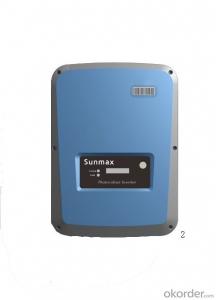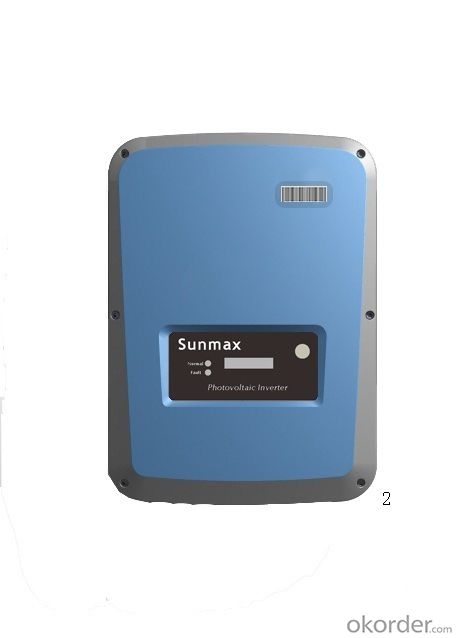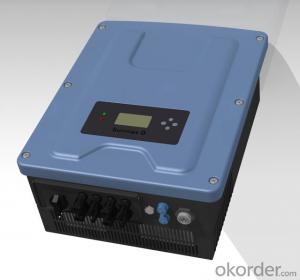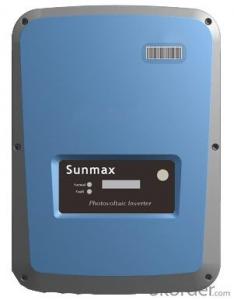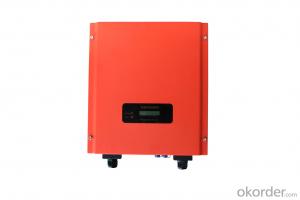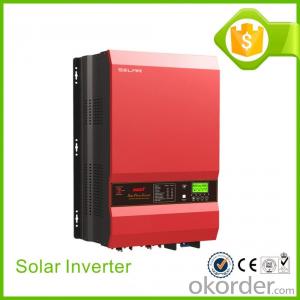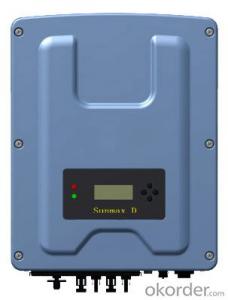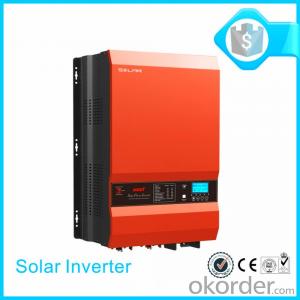Alpha Solar Inverter PV Sunmax 2000/3000/4000/5000
- Loading Port:
- Shanghai
- Payment Terms:
- TT OR LC
- Min Order Qty:
- 5 watt
- Supply Capability:
- 3000 watt/month
OKorder Service Pledge
OKorder Financial Service
You Might Also Like
Product Details
Sunmax 2000/3000/4000/5000 series are string type solar inverters for home grid connected solar generation systems. The Sunmax 1.5-5Kw series products are both reliable and good looking, have excellent technical characteristics and can be installed either indoors or outdoors.
High Efficiency:
The maximum efficiency of the inverter is up to 97.6%.
Single MPPT
Transfomer-less design
Wide range of MPPT voltage
Safe:
The units have built-in leakage current monitoring devices.
Units use thin-film capacitors ensuring better product performance.
IP65 protection class
Optional DC switch
Flexible:
indoor and outdoor installation option
Multilingual LCD display for the user to select
Hanging design makes installation easy.
RS485 integrated interface and the Bluetooth communication module makes the units convenient for monitoring
- Q: Can a solar inverter be used with different types of solar cell technologies?
- Yes, a solar inverter can be used with different types of solar cell technologies. Solar inverters are designed to convert the DC electricity generated by solar panels, regardless of the type of solar cell technology, into AC electricity that can be used to power homes and businesses. Therefore, whether it is monocrystalline, polycrystalline, thin-film, or any other solar cell technology, a solar inverter can efficiently convert the generated electricity into usable form.
- Q: What happens to excess solar energy generated by the inverter?
- Excess solar energy generated by the inverter can be stored in batteries for later use or exported to the power grid, depending on the setup.
- Q: Can a solar inverter be used with different brands of solar panels?
- Yes, a solar inverter can be used with different brands of solar panels as long as they have compatible specifications and electrical characteristics. However, it is recommended to consult the inverter manufacturer's guidelines or seek professional advice to ensure compatibility and optimal performance.
- Q: How does a solar inverter protect against overvoltage and overcurrent?
- A solar inverter protects against overvoltage by continuously monitoring the voltage levels of the solar panels and adjusting the conversion process to ensure that the output voltage remains within a safe range. In case of overvoltage, the inverter automatically reduces the power output or shuts down to prevent damage to the system. Similarly, the inverter safeguards against overcurrent by constantly monitoring the current flowing through the system. If the current exceeds the safe limits, the inverter utilizes protective measures such as reducing the power output, regulating the current, or triggering a shutdown to prevent any potential damage to the solar panels or connected devices.
- Q: Can a solar inverter be used in regions with high levels of dust or debris?
- Yes, a solar inverter can be used in regions with high levels of dust or debris. However, it is important to regularly clean and maintain the inverter to ensure optimal performance and prevent any damage caused by the accumulation of dust or debris.
- Q: How does a solar inverter handle voltage and frequency regulation?
- A solar inverter handles voltage and frequency regulation by converting the direct current (DC) generated by solar panels into alternating current (AC) that matches the voltage and frequency of the electrical grid. It does this by using advanced power electronics and control systems to monitor and adjust the output voltage and frequency to meet the required standards. This ensures that the electricity generated by the solar panels is compatible with the grid and can be seamlessly integrated into the existing power supply.
- Q: How do you choose the right input voltage range for a solar inverter?
- When choosing the right input voltage range for a solar inverter, it is essential to consider the specifications and requirements of the specific solar panels being used. The input voltage range should be compatible with the voltage output of the solar panels to ensure optimal performance and efficiency. Additionally, factors such as the system size, installation location, and local regulations should also be taken into account to determine the appropriate input voltage range for the solar inverter.
- Q: How does a solar inverter handle electromagnetic interference (EMI)?
- A solar inverter handles electromagnetic interference (EMI) by implementing various measures to mitigate and minimize its impact. These measures include using proper shielding techniques, filtering the input and output signals, and complying with relevant EMI standards and regulations. Additionally, advanced digital signal processing techniques may be employed to suppress any EMI-induced noise and ensure the efficient conversion of solar energy into usable electricity.
- Q: Can a solar inverter be used with different types of energy management systems?
- Yes, a solar inverter can be used with different types of energy management systems. Solar inverters are designed to convert the DC (direct current) electricity generated by solar panels into AC (alternating current) electricity that can be used to power various electrical devices and appliances. These inverters can be integrated with different energy management systems, such as smart grids or battery storage systems, to optimize energy usage, monitor performance, and enhance overall energy efficiency.
- Q: How does a solar inverter handle reactive power injection into the grid?
- A solar inverter manages reactive power injection into the grid through the use of power factor control techniques. It adjusts the phase relationship between the voltage and current to ensure that the power factor remains within acceptable limits. This is achieved by either absorbing or injecting reactive power as needed, helping to stabilize the grid and improve overall system efficiency.
Send your message to us
Alpha Solar Inverter PV Sunmax 2000/3000/4000/5000
- Loading Port:
- Shanghai
- Payment Terms:
- TT OR LC
- Min Order Qty:
- 5 watt
- Supply Capability:
- 3000 watt/month
OKorder Service Pledge
OKorder Financial Service
Similar products
Hot products
Hot Searches
Related keywords
